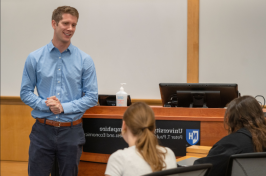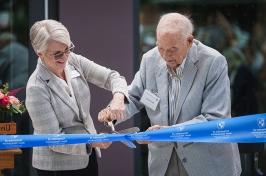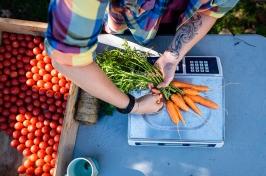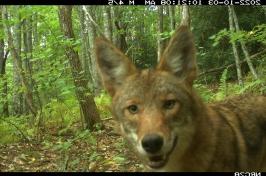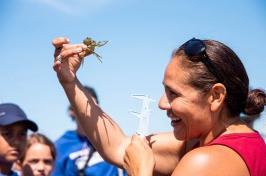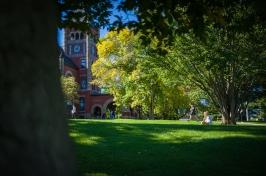
Alyssa Stasse ’25G is the first member of her family to attend a four-year college. She’s also a self-proclaimed science convert, having found the subject matter “super boring” in high school before diving into research as an undergrad that completely changed her perspective.
The result? She’s now hoping to combine higher education and science to build a career in academia. Before she gets there, she’s also trying to open doors for other young students to follow in her footsteps.
The College of Life Sciences and Agriculture (COLSA) recently hosted more than 60 students from three biology classes at Manchester West High School at a “Day as a Scientist” event, organized and run by Hasse. Students got to choose from five different science experiment stations and spent the day creating and testing hypotheses, exploring the scientific method and analyzing results.
Stasse chose Manchester West because of its diverse population and the socioeconomic challenges facing the district, which typically makes access to these kinds of opportunities hard to come by.
"I wanted to show them that college is attainable even if you are the first person in your family to go, and it's something you can do and something you can be good at if you put the time into it."
“I’m a first-generation college student myself, so I wanted to make this opportunity available to them because often with schools in their situation they don’t get as any resources as other schools do to go to these kinds of events,” Stasse says. “In high school I wasn’t interested in science at all, but coming to college I was able to do my own research projects and see, ‘Oh, this is something I could really be interested in.’ I wanted to show them that college is attainable even if you are the first person in your family to go, and it’s something you can do and something you can be good at if you put the time into it.”
The day featured five stations where students could conduct experiments in groups of two, including several focused on marine biology as well as one about ocean floor mapping and another featuring animal skulls. Each station featured 10-12 students.
Among the most popular stations, Stasse says, were one where students had to build their own phytoplankton with pipe cleaners, corks, washers and other equipment and make it neutrally buoyant, meaning it neither sank nor floated, and another featuring green crabs that students had to measure and weigh.
The students spent two hours working through the scientific method and “trying to think bigger picture” about what the outcomes of the experiments meant, Stasse says. They then had lunch by Great Bay and talked about the broader impact of the results they all found.
“It was cool to see them getting frustrating at first and redoing their method, repeating that scientific process over and over,” Stasse says. “That’s something we really tried to emphasize, that it’s not a linear process, it’s constantly evolving. So to see that in real time was really fun.”
Stasse was determined to bring a well-rounded experience to the visiting students that showcased the ways college could be attainable for them. She had a representative from UNH’s TRIO program – which is designed to increase college retention and graduation rates and help students transition from high school and is open to those who are first-gen, from low-to-modest income backgrounds or have a disability – speak to the students. She also had Elizabeth Harvey, associate professor of biological sciences, highlight some of the different opportunities available to undergrads at UNH.

Representatives from financial aid and admissions were on hand, as well, to talk about scholarship and aid opportunities, including those with a diversity, equity and inclusion focus.
“I heard from one of the teachers right after the event that quite a few students expressed some very in-depth interest in biology and that it was a hands-on thing that felt attainable to them, so I felt like it was a huge success,” Stasse says.
Stasse had been working on bringing the day to fruition for almost a full calendar year. The initial aim was to host the event in May, but logistical challenges led to the postponement. Stasse says she and the others who helped coordinate things – including grad students Faith Frings and Ana Silverio – have been working “almost nonstop for the past three months,” and she was quick to credit the 25 or so volunteers from COLSA who made everything possible during the day of the event.
Stasse is hoping the success of the day leads to others just like it down the road. She said that Anthony Davis, dean of COLSA, has expressed an interest in making it an annual event and expanding it beyond the marine biology focus, and that some funding is likely available from the COLSA Inclusion, Diversity, Equity and Access (IDEA) fund.
In the meantime, Stasse was thrilled to reflect on the positive vibes from the inaugural day, which exceeded her expectations in highlighting many ways higher education and opportunities in science can be available to students who hadn’t previously believed they could be.
“It’s something I’ve always valued as really important, those outreach opportunities to students who don’t typically get them,” Stasse says. “So being able to have the ability to host one of those events, it’s made my days lately a little bit better.”
-
Written By:
Keith Testa | UNH Marketing | keith.testa@hwfj-art.com












